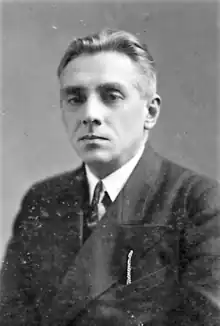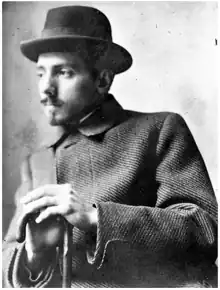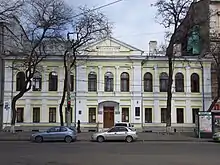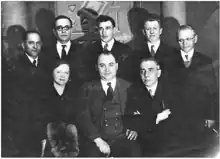Mykola Vilinsky
Mykola Mykolayovych Vilinsky[note 1] (Ukrainian: Микола Миколайович Вілінський; 14 May 1888 – 9 September 1956) was a Soviet and Ukrainian composer who held senior chairs at the Odesa Conservatory and later the Kyiv Conservatory. He wrote articles on Ukrainian and Moldovan music, and was a music critic and an expert on the works of the Ukrainian composer Mykola Lysenko.

Following the wishes of his father, Vilinsky was initially educated for a career as a lawyer, but then changed to study music at the Odesa Conservatory, from which he graduated in 1919. He taught and composed there for twenty years. During the Second World War he and his family was evacuated from Odesa to Tashkent, where he continued to teach and compose. After the end of the war, he returned to Ukraine and became a professor at the Kyiv Conservatory, where he remained until his death in 1956. His students included Kostiantyn Dankevych, Oleksandr Bilash, Oscar Feltsman, David Gershfeld, and Anton Mucha.
Vilinsky's output includes symphonic suites, music for piano, and arrangements for choir and solo voices of Ukrainian, Russian, Moldavian folk songs. His daughter, Iryna Mykolaivna Vilinska was also a professor of music and a composer.
Life
Early years and education

Mykola Mykolayovych Mykola was born on 2/14 May 1888,[note 2] in Holta, in the Russian Empire, now part of the Ukrainian city of Pervomaisk.[1] He had an older sister, Tamara.[2] Vilinsky's mother Olena Petrovna was descended from the Baroque era composer Josse Boutmy, who belonged to a family of musicians from Ghent known as the Boutmy Dynasty.[3] His father Mykola Oleksandrovych Vilinsky was the mayor of Ananiv.[4] The family on his father's side was descended from a Polish nobleman, Tomasz Wiliński. [5]
The Ukrainian writer Marko Vovchok, born Mariia Vilinskа may also have been related to the family. The so-called "golden soprano" of the Bolshoi Theatre, Ksenia Derzhynska, and the musicologist and writer Alexander Ossovsky were both his cousins.[4]
Vilinsky's mother was his first music teacher. He began to seriously engage in music on his own whilst at school in Ananiv, conducting the church choir and organizing the school's folk music orchestra. After he completed his school education in 1906, his father decided to prepare his son for a career in law, and Vilinsky entered the Faculty of Law of the Imperial Novorossian University in Odesa, where he graduated in 1912.[4] For a short period he worked in the Odesa District Court.[6]
Whilst still studying law, Vilinsky attended the Odesa Music School, where he studied composition under the Polish composers Witold Maliszewski and Witold Lutosławski.[4][note 3] Maliszewski valued Vilinsky as one of his best students. When he and his family was forced to leave Odesa, attempted to take Vilinsky along with them. Despite the strictly enforced censorship that existed, Vilinsky and Maliszewski continued to correspond.[4] In 1917 he finally abandoned the idea of a career in law to devote himself to music.[6] Despite his studies being interrupted in 1916 by conscription into the army,[7] he graduated from the Odesa Conservatory in 1919.[8]
Career

During his career Vilinsky lived and worked in Odesa and Kyiv, separated by a period during the Second World War during which he was evacuated to Tashkent.[1] Along with his work as a composer and teacher, he wrote articles on Ukrainian and Moldovan music, and was a reviewer, a music critic, and an editor, when he oversaw the publication of the complete works of the Ukrainian composer Mykola Lysenko.[8]
From 1920 to 1941, Vilinsky taught at the Odesa Conservatory,[1] succeeding Malyshevsky. At Odesa his talent developed and he gained recognition as a composer. In 1926 he was promoted to the rank of professor, and in 1931 he became the head of the department of composition. In 1935 he became the director of the Odesa regional organization of the Union of Composers of Ukraine, his deputies being two of his students, Serafim Orfeev and Leonid Gurov. Vilinsky was also a member of the board of the Union.[9]
In 1941, Vilinskyi and his family evacuated to Tashkent.[2] Along with Lev Revutsky, he worked as a professor at the Tashkent Conservatory. [10] He remained there until 1944, when he returned to Ukraine.[1] During the war, the Romanian authorities in occupied Odesa succeeded in permanently acquiring a number of Vilinsky's compositions, as well family documents and part of his music library.[11]
In 1944, Vilinsky returned to Ukraine and lived in Kyiv, where he led the composition department at the Kyiv Conservatory, a post he held until 1956.[1] Vilinsky was made an Honoured Artist of the Ukrainian SSR in 1951; he was awarded the Order of Lenin in 1953.[8] He was one of a trio of outstanding composers at the Kyiv Conservatory known as the "Three Mykolayovyches", which consisted of Vilinsky, Revutsky, and Borys Lyatoshynsky.[12][note 4]
Students

During the 1930s, Emil and Elizabeth Gilels, David Oistrakh, Yakiv Zak, Maria Grinberg and other musicians studied together with Vilinsky.[4] His other students included Kostiantyn Dankevych, Oleksandr Bilash, Volodymyr Femilidi,[8] Oscar Feltsman, Orfeev, Anton Mukha, Gurov, David Hershfeld, Maria Zavalishina, Albert Vodovozov, Yevhen Zubtsov, and Valentin Kucherov.[4] Orfeev, who later became rector (principal) of the Odesa Conservatory wrote, "It seems that there was no composer in Odesa who did not consult with Mykola Mykolayovych.... and his advice was unconditionally accepted."[4]
When Vilinsky realised that Dankevych had the potential to become a composer, he insisted that he attended composition classes. During the 1930s, Dankevych saved Vilinsky from the so-called "proletarian purge" at the Odesa Conservatory.[4] After the Second World War, he regularly visited Vilinsky at his dacha in Vorzel, spending time discussing composition with him, or relaxing with the family. In 1951, when Dankevich was being persecuted for his opera Bogdan Khmelnytsky, Vilinsky defended his student and supported him on his revision of the work.[13] Vilinsky remained as his mentor after he graduated from the Odesa Conservatory; their friendship lasted until after Vilinsky's death a decade later.[4]
Family

Vilinski's son Serhii was born in 1916. When the Soviet Union was attacked by Nazi Germany in 1941, Vilinsky had the opportunity stop his son fighting on the front line, Serhil survived the war, having fought with the Red Army in Bessarabia, Caucasus, the Crimea, and Königsberg. [11]
The composer's daughter Iryna Mykolaivna Vilinska was a singing teacher who wrote songs, arrangements of folk songs, and music articles.[4]
Death
Vilinsky died in Kyiv on 9 September 1956,[1] and was buried in the Baikove Cemetery in Kyiv.[14]
Music
Vilinsky's artistic output included symphonic suites, cantatas, vocal and choral arrangements of Ukrainian, Russian and Moldovan folk music, chamber and instrumental works.[15] He developed the traditions of the neo-romantic school of Rimsky-Korsakov, Glazunov and Anatoly Lyadov, using motifs linked with Ukraine and Moldova.[4]
Vilinsky's early compositions have an elegiac style and contain bright impressionistic colouring.[15] The composer's youthful works include miniatures without an opus: "Sad Song", "Mourning March", "Two Mazurkas", "Elegy", "Waltz", "March" (1905–1909), "Preludes No. 1 and No. 2" (1909, re-edited in 1949 and 1925). "Prelude for the left hand", and "Fugue" in B-flat minor.
Vilinsky composed skilfully with a style that was post-Romantic and greatly influenced by Ukrainian folk music. He was accomplished in orchestrating Ukrainian songs,[8] which along with traditional Moldavian folk songs, individualized his style.[15] The songs of Grandfather Spiridon, old Moldovan beggar Vilinsky's father had once assisted at a fair, went on to influence the young composer's musical style.[16] He helped develop the national musical culture of Moldova, travelling around its most remote areas and collecting songs and dance tunes.
List of compositions
|
Data from National Union of Composers of Ukraine.[2] Orchestral works
Music for brass band
Piano
Choral music
Songs
Reputation and legacyVilinsky played a role in the rebirth of Ukrainian political and cultural identity from 1910 to 1932.[8] He was a key figure to the process of developing Ukrainian piano music to have an clear Ukrainian style.”[13] Lyatoshynsky wrote of Vilinsky that "He was a wonderful musician and a wonderful person. All his works bear the stamp of true talent and all of them show the fine taste and great professional skill of the author. As for Mykola Mykolayovych as a person, everyone who even occasionally met him could not help but be convinced of his high mental qualities, which were manifested throughout his life."[4] Vilinsky edited some of Lysenko's piano works, published from 1952–1953.[4] Notes
References
Sources
Further readingExternal links
|